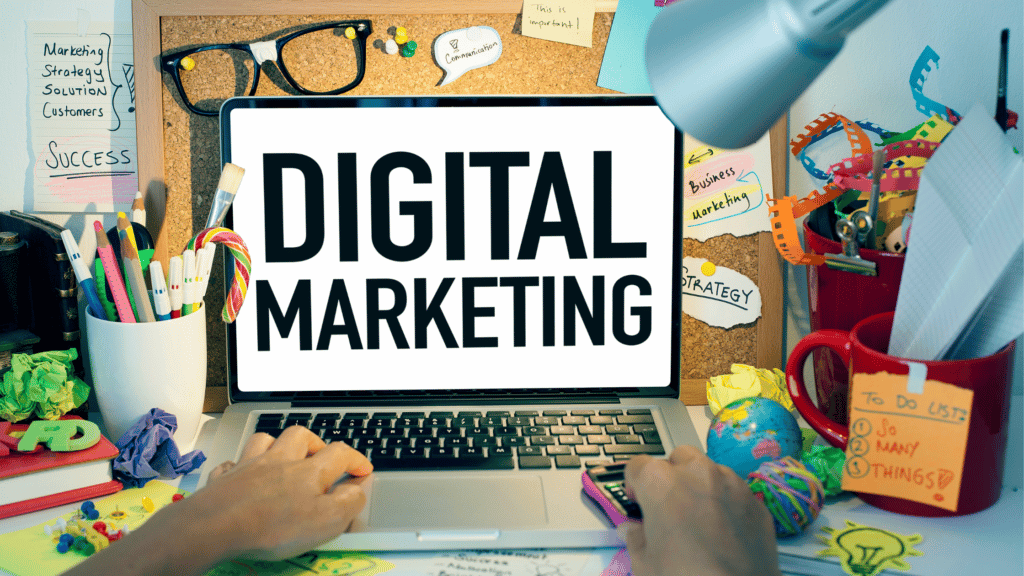Why Digital Marketing is Important for Small Business
A business is a package that delivers goods or services to consumers. That’s what they do as their core business activity. They may offer more than one service, but there’s got to be at least one product sold otherwise you don’t have a business. A simple example would be the pizza parlor. You sell pizzas and bread sticks which are your products, and you deliver those items to your customers either by sit down dining in a restaurant setting, a take out style of approach, or using some form of delivery system such as a bicycle or car or self-driving vehicle! Improve your business through Digital Marketing.
2. The internet has changed the way we live, work, and play
The internet has changed the way we live, work, and play. It has allowed us to connect with others around the world, and has given us access to information that we would never have otherwise been able to obtain.
The internet has also allowed us to work from home, which has made it easier for us to balance our work and personal lives. We no longer have to go into an office every day, and can now work from the comfort of our own homes.The internet has also allowed us to purchase items online, which has made it easier for us to find the items that we are looking for. We no longer have to go from store to store in order to find the item that we want, and can now find it online in just a few minutes.
The internet has changed the way that we do business. It has allowed us to carry out tasks online, including paying our bills and filing our taxes.
The internet has also changed the way that we shop for items. We no longer have to go into a store in order to purchase an item, but can now purchase it online.
The internet is one of the greatest inventions in the history of mankind. It has changed the way that we live, work, play, communicate with others, shop for items, pay bills, file taxes…the list goes on and on!

3. Digital Marketing can be broken down into 4 different types of marketing channels
Digital Marketing can be broken down into 4 different types of marketing channels. I am going to give an overview on social media, organic search engine optimization (SEO), paid search engine marketing (PPC) and content marketing.
Digital channels are great tools for marketers because they offer less restrictions than traditional methods. You can monitor the success of each channel easily, whereas it’s often harder to tell how effective face-to-face networking will be until after you’ve done it. Digital channels also allow international outreach at affordable costs, making them great options for businesses that want to reach out beyond their physical location.
However, there is no best digital channel; which one your company should invest in depends on a variety of factors such as your industry and target audience. You may find that certain strategies work better than others based on what you’re trying to achieve.
Social Media Marketing is a phrase that most people have heard of and many can relate with, it’s also one of the biggest digital channels out there and good for businesses of all sizes. A recent study has shown that 81 percent of marketers plan use Social media as part of their marketing strategy and this number is only going up, according to industry statistics more than 1 billion users log onto social media websites everyday – so why wouldn’t your business want to be there? Here are some ways that companies like yours can start getting involved:
The first step would be setting up profiles on popular social networking sites such as Facebook, Twitter & Pinterest; remember you can always cross promote these sites across other channels. Next you’ll need to invest some time into thinking of a good profile name and description, this is usually where most businesses fall down with their profiles and miss out on potential customers. Then it’s all about engaging with your audience and finding out what they like or don’t like by asking questions or testing polls. Once you’ve got the basics figured out you can start thinking about strategies such as contests, promotions etc…
Social media isn’t just for business to consumer interactions either; many B2B companies are getting involved so they reach new clients in new ways – check some examples here .
SEO (Search Engine Optimization) helps websites rank higher in search results pages. This practice involves improving a website’s keyword presence using different methods such as on-page optimization, link building and blogging.
SEO is often thought of as a long-term investment, because it takes time to see any real results. However, if done correctly it can be extremely effective in driving targeted traffic to your website.
PPC (Pay Per Click) is a form of online advertising where you pay for each click that your ad receives. This type of marketing can be used to achieve a variety of goals such as increasing brand awareness, generating leads or driving sales.
One of the benefits of PPC is that you can see exactly how much money you’re spending and what you’re getting in return. This makes it a great option for businesses that want to test different keywords or advertisements without having to wait months for results.
Content marketing is often thought of as one of the ‘oldest’ digital channels, but it’s still extremely effective. Content marketing refers to creating and sharing your own content with your target audience so they stay up-to-date with your business and tell their friends about you. This could be blog posts, videos or even images that are published on social media sites like Pinterest or Instagram. Content Marketing is all about giving consumers what they want by providing them with information, resources or entertainment that they can share around the web – great for building trust between yourself and your customers too!
The basic principles for developing successful marketing objectives are:
- Identify what would constitute success We need clarity on what we mean by “success”. Success means different things depending on whether our objective is to increase awareness, generate leads, increase sales or improve customer retention.
- Be specific and measurable Success can be quantified so that it can be tracked and monitored. This allows us to determine what progress has been made towards the achievement of our objectives.
- State the objective in terms of results rather than activities The objective should focus on what we want to achieve, not how we will do it. For example, “increase website traffic by 50%” is better stated as “increase website traffic from 500 visitors per day to 750 visitors per day.”
- Define the time period over which the objective will be achieved Objectives should be achievable within a set timeframe – typically 12 months.
- Align objectives with overall business strategy Objectives should be aligned with the company’s overall business strategy.
- Be realistic and achievable Objectives should be challenging yet realistic. Setting objectives that are impossible to achieve will only demoralize staff and lead to frustration.
- State the objective in terms of dollars, leads or contacts Whenever possible, state the objective in terms of financial returns (e.g., “increase sales by $10,000 within 12 months”), leads or contacts (e.g., “increase leads generated from website by 25% within 12 months”).
4. What are some common mistakes made by new marketers
“Common Mistakes New Marketers Make” is a hot topic on a lot of forums. This article will give you some insight into the mistakes that should be avoided at all costs to have a successful online career.
1) Thinking they’re going to get rich quick.
2) Failing to plan their business, or understanding where there time goes.
3) Working from home as an employee, not as an entrepreneur with control over their income and their life!
4) Not having goals and writing them down… somewhere. They need to be SMART goals written down in your biz planner so you can visualize your success every day!
5) Believing everything they on blogs or hear in podcasts without doing any fact-checking.
6) Jumping on every new shiny object or bandwagon program without researching it thoroughly.
7) Not creating a lead capture page and building an email list from the get-go!
8) Spending all their time creating product instead of marketing it, or spending all their time marketing instead of creating product.
9) Not tracking their results to see what’s working and what’s not (and tweaking accordingly).
10) Quitting too soon because they don’t see results right away – Rome wasn’t built in a day!

5. How do you measure success with digital marketing
– Do you measure it by users, followers, likes, tweets? – Or do you measure more sustainable metrics like cost per lead or conversion rate?
I’d say there are lots of different ways to measure success with digital marketing. Some of the most common measurements I use are: Cost Per Lead Conversion Rate Traffic User Engagement Reach/Audience Social Media Metrics (number of likes etc.) It’s hard to pin down what is “the most successful” in digital marketing because it largely depends on your overall business objectives and metrics that tie back into those objectives. Let me give you an example. Take one of my clients that sells high ticket training courses. It would be very easy for them to gauge success by measuring how many people sign up for their courses. In this case, website traffic and conversion rate (from leads to sales) would be two of the most important metrics. Another example is a company that sells a service that is only used once, like a hotel reservation. In this case, number of bookings, average booking value and customer satisfaction rates would be more important success metrics. So as you can see, it really depends on your business and what you’re trying to achieve. That being said, there are some general tips I can give on how to measure digital marketing success: 1) Set realistic goals – don’t expect to see results overnight. It takes time to build up a successful digital marketing campaign
2) Tie your goals back to your business objectives – everything you do should support the company’s overall objective
3) Put together a detailed analytics plan to measure your success
4) Review data regularly and adjust campaign strategy accordingly
5) Don’t always rely on “vanity metrics” like website traffic, likes or follower numbers.
These can be manipulated easily. Instead, look at how these users are behaving or what they are doing after being exposed to your content 6) Look at the big picture. Your digital marketing should have an effect on your entire business not just one area Good luck with measuring your own digital marketing success! I’d love to hear about some of the ways you’ve measured success in the past or any other tips that have helped you increase your online presence .
